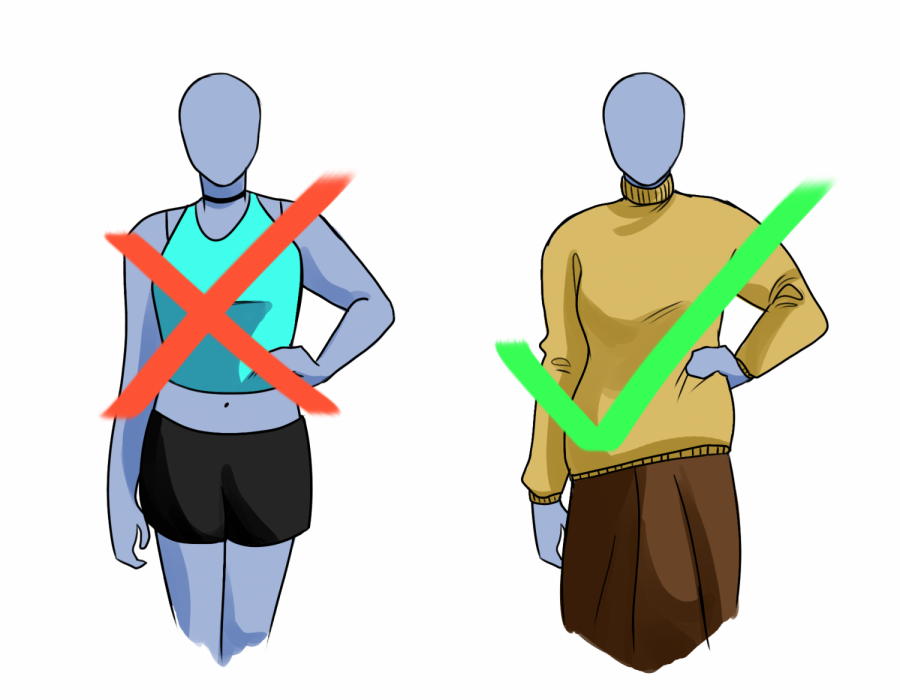The school dress code unfairly targets girls
The outfit on the left is deemed to be inappropriate by RM’s dress code, but certain students tend to be more targeted than others.
October 30, 2019
When you go to school, sometimes your feelings are like a roller coaster. You’re so happy because you finally decided on an outfit that makes you feel confident and content, but then those feelings immediately wash away as you’re dragged to the principal’s office, forced to wear something else. Hence, your feelings of triumph are plummeted down like a roller coaster.
This is due to the school dress code. A school dress code is the guidelines students are required to follow when choosing clothes for school. The MCPS dress code states, “Students are expected to dress in clothing appropriate for the season and for the school setting or activity in which they are present.”
Violation of the dress code is enforced by punishment. The MCPS dress code also mentions, “Students violating the policy will be required to obtain suitable clothing and may be subject to disciplinary action.” Disciplinary action in this scenario usually refers to students being pulled aside by administrators or forced to change their clothes.
Dress codes not only make you feel upset, but they completely stigmatize your body. They often target girls with a specific body type or physical attributes which are out of their control, teaching them that they shouldn’t be comfortable being themselves. It implants in girls’ minds that there is something wrong with their physical body.
A student speaks out about this issue. “It makes girls think I can’t express the way I feel or the way I am. Girls can get whatever they want, but boys can’t. It’s sexist.” freshman Citlali Pelaez said.
According to an article on the website Education Week, dress codes do more than stigmatize body types, saying, “A Roman Catholic school in New Orleans came into the internet spotlight when a 6th grader was forced to leave the classroom, in tears, for having braided hair extensions, which were against the school’s hair policy.”
More and more public schools are stigmatizing not only body types, but the hair of girls, since having braided hair creates a “distraction” to a professional environment. The fact that this is a reality is ridiculous. The hair of a girl is also part of who she is. Therefore, it is utterly ludicrous that a school would punish this and pass it on as a violation of the “hair policy.”
Another sad truth is, dress codes are more targeted at girls. According to an article on The Washington Post, most dress codes focus on girls’ clothing.
I have sadly seen this issue take place at Richard Montgomery, and it is known to occur in many other schools as well. Guys are allowed to wear their pants sagging down, but girls can’t wear a simple tank top? Dress codes are now essentially enhancing gender inequality, making girls feel unequal to boys just because of the clothing they want to wear. If dress codes want to be strict, then they should at least be fair.
Another student speaks out about this issue, saying, “When your body is not that developed, you are less likely to get dress coded,” freshman Ishatu Bakarr said. “But when your body is developed, you are more likely to get dress coded. It stereotypes depending on how your body looks.”
I have come to notice this situation as well, and it absolutely disgusts me. According to an article on The Washington Post saying, “When school policies enforce restrictions on clothing perceived as too tight or low-cut, the report’s authors write, girls who are curvier or more developed often end up being punished for their body types.”
Schools blatantly shaming girls for how their body is horrifies me. If a curvy girl wants to wear a crop top and shorts, then she shouldn’t be looked like a disgrace for it. It is her body and who she is, so she should be allowed to wear the clothing she desires to wear. Dress codes stigmatizing bodies will only grow the insecurities of girls and make them feel more indignant. Once again, if dress codes want to be strict, then they should at least be fair, and not deprive someone of something that another can have.
Schools are meant to teach students to self-love and accept themselves, but dress codes are forcing them to feel the opposite. Schools around the world need to rethink their policies, because girls showing off their bodies should not be looked on as distracting, but merely because that is their body, and it is who they are.


